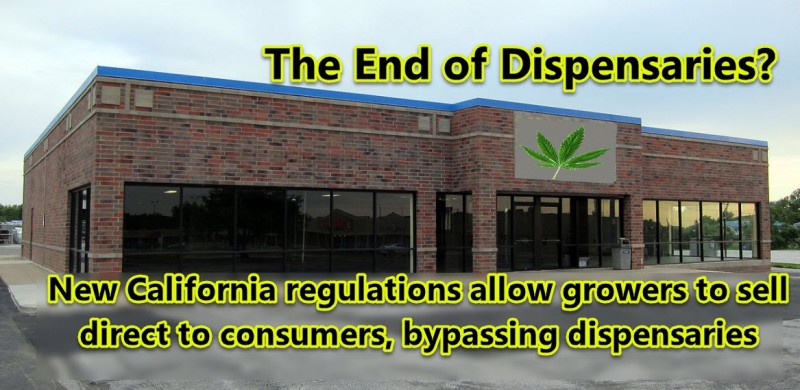The End Of Dispensaries?
Growers can bypass dispensaries and sell direct to consumers, soon.
As we have been saying for years at Cannabis.net, a cannabis dispensary is a legal anomaly. They exist due to certain quirks in the law surrounding the cannabis plant. Once those laws change, and you can get your medical or recreational marijuana at CVS, Rite aid, Walgreen, Walmart and delivered by using and app on your phone, why would you physically go to a stand-alone dispensary? Well, the prediction is coming true, and it is starting in the biggest and most powerful cannabis market in the world.
If you’re a consumer living in California, well, the living standards are about to get as high as it gets.
Just this week, lawmakers from the Golden State will be considering a new measure allowing organic cannabis samples sold at county fairs to be delivered straight to your home. This is part of the state’s preparation for legal cannabis sales set to start next year.

We’ve all got Governor Jerry Brown, as well as other Californian lawmakers to thank, as they work behind the scenes to fuse the state’s new recreational cannabis use law with the existing medical cannabis program. The administration is currently working on a set of rules so consumers are protected, all the while ensuring public safety is a priority and taxes will also be collected.
Head honchos of the legislative Democrats and Brown worked the provisions into the state budget agreement this week, which was announced after months of negotiating with cannabusinesses both in the legal and illegal arena as well as investors who want to continue pouring money into the country’s biggest legal cannabis market. “One of the biggest challenges we have is taking a multi-billion-dollar industry out of the dark and now into the light,” says Democratic Sen. Mike McGuire, whose district covers a significant area where you’ll find most of Northern California’s cannabis growing operations.
Come next year, California state officials can be expected to have rules set in place overseeing the legal cannabis market, which is foreseen to bring in yearly sales revenues of $7 billion. The regulations will cover where and how cannabis plants can be cultivated, as well as standards to track the plant from the field all the way up to the stores. Later in 2018, complete legal sales will already likely roll out.

Treat Cannabis Like Alcohol
Basically what this means is that California will soon treat cannabis the way it does booze. Adults 21 years of age and older can legally possess up to one ounce of cannabis, and grow up to 6 plants at home. The administration allocated a budget agreement of $118 million to cover costs of startups that will contribute to the newly regulated industry. Tech startups and more staff will be needed to help out with issuing licenses and ensuring the regulations are complied with.

California will also open up a tax office in a remote part of San Francisco so that cannabis businesses can efficiently pay taxes in cash without the hassles of driving long distances carrying thousands of dollars. Since cannabis is still illegal according to federal law, cannabis businesses still can’t open bank accounts or enjoy other financial benefits that other companies do, such as use credit card systems or use other features of the federally regulated banking system. Since California already has a successful artisanal industry for craft beer and wineries, the new legislation will allow cannabis to enjoy the benefits of the industry as well.
State regulators will have to create their own rules so that cannabis producers will be able to refer to their products as organic cannabis. This is a significant aspect of the legislation so that California consumers can enjoy cannabis that otherwise won’t suffer from the pitfalls of being considered illegal federally. State standards will also allow official cannabis varieties and appellations (growing regions) in order for craft producers to differentiate their products depending on the same conditions as winemakers, except for cannabis it would be based on unique strains and growing conditions.
The state will issue temporary licenses to businesses so that they can sell cannabis and even provide samples at county air as well as cannabis festivals and regional agricultural associations. Growers will be legally permitted to create agricultural cooperatives without violating antitrust laws. Additionally cannabusinesses will also be able to legally cultivate, distribute, and sell the plant in various forms although there will be independent testing firms analyzing the product for safety.
The question then becomes, why would anyone pay the going rate of $5million to $6million in California for a retail license when they will close to worthless with growers selling direct products to consumers?
However, it will still be illegal to store cannabis in open containers while in vehicles; just like how it is for alcohol in the state, unless you have an MMJ card or a prescription from a doctor. According to Hezekiah Allen, who heads the California Growers Association, “There are thousands of businesses currently engaged in this type of commerce.”
He adds, “The more of them that can get licensed, the better off the state is going to be, the faster we’ll be able to get rid of the criminal element and the faster we’ll be able to make sure the product is safe and tested.”
OTHER STORIES YOU MAY ENJOY...
HOW CALIFORNIA IS PROTECTING SMALL CANNABIS GROWERS, CLICK HERE.







